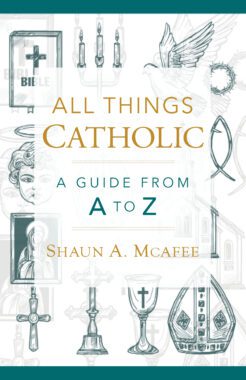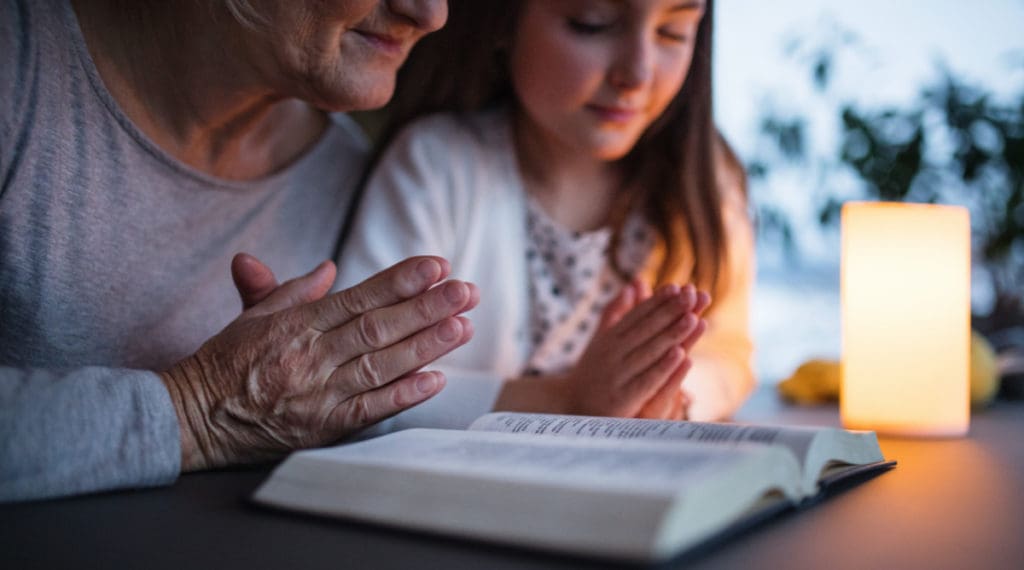I absolutely love the Catholic Church.
There is nothing that gives me such stalwart confidence and hope for my salvation. In response to this love, I have made it my mission to dialogue with Catholics all over the world, and what I’ve discovered is that many Catholics want to know more about their faith but have no idea where to begin.
Catholics in the twenty-first century have more factors working against them now than others had during many of the most challenging periods in the Church’s history. In order to fulfill our calling to evangelize in these difficult times, we must learn about our Faith.
That’s where this book comes in.
_____
Ascension
The biblical event of Jesus being “carried up into Heaven” (Luke 24:51).
Traditionally, it is believed that the Ascension event took place on the Mount of Olives. The interpretation of this event is not that Jesus was symbolically transported to Heaven but that His whole Body was “lifted up” (CCC 662) forty days after the Resurrection, as witnessed by the apostles (Acts 1:9).
The Solemnity of the Ascension of the Lord is celebrated in some dioceses on the fortieth day after Easter, a Thursday, although many episcopal sees have transferred it to the following Sunday. The Ascension is a fundamental part of the raising of Jesus to “the right hand of the Father” (Mark 16:19), where He exercises power over the whole universe. The Ascension of Jesus began the period of the apostolic delegation to the Church on earth, with the promise of the Holy Spirit to come at Pentecost. Consequently, following the Ascension, the Church became the visible presence of Christ’s authority.
Paul highlights this reality: “But God, who is rich in mercy, out of the great love with which he loved us, even when we were dead through our trespasses, made us alive together with Christ (by grace you have been saved), and raised us up with him, and made us sit with him in the heavenly places in Christ Jesus” (Eph. 2:4–6).
Even now, our participation with Christ seats us in the heavens.
Catholic Tip:
Christ’s Ascension is celebrated on the Feast of the Ascension, forty days after Easter Sunday, in keeping with the biblical narrative. “To them he presented himself alive after his passion by many proofs, appearing to them during forty days” (Acts 1:3). Currently, the United States Conference of Catholic Bishops (USCCB) has permanently transferred the observation of this feast to the next Sunday as a norm, but some dioceses still observe Ascension on Thursday.
_____
Hope
The theological virtue by which we are given the desire to please and possess God and that gives us confidence that we will receive every necessary grace to accomplish this end.
Hope, along with faith and love, is a theological virtue, meaning it finds its meaning and end in the desire for God—it is a response to our aspiration for eternal happiness in Heaven. As a theological virtue, it is infused into the soul with the sacrament of Baptism. This hope means that we are not confident in our own strengths and merit but in the grace of the Holy Spirit (CCC 1817).
The Catechism reminds us that “Christian hope takes up and fulfills the hope of the chosen people which has its origin and model in the hope of Abraham … ‘Hoping against hope, he believed, and thus became the father of many nations’ ” (CCC 1819, quoting Rom. 4:18).
According to our own circumstances, all Christians share a hope for a better future, but we are reminded that our ultimate hope or ultimate happiness is in our ultimate destination of Heaven. Hope takes shape in the believer as he follows God and seeks to accomplish His will, remaining in communion with Christ’s Church and prevailing against the sins of despair and presumption.
Catholic Tip:
The Act of Hope is a powerful and encouraging prayer and intention to say on a regular basis: O Lord God, I hope by Your grace for the pardon of all my sins and after life here to gain eternal happiness because You have promised it who are infinitely powerful, faithful, kind, and merciful. In this hope I intend to live and die. Amen.
_____
Miracle
A supernatural event in which God intervenes in the world in a way that cannot be attributed to a natural cause.
Miracles are solely attributable to God, and although they cannot be explained by science, they are observable. God’s power in a miracle is directed through His own immediate action, or through the mediate action of His creatures as His instruments. Theologians agree that there are three general purposes for a miracle: to lead someone to belief, to verify the sanctity of a person or place, or to validate a truth or divine mission.
Christ performed miracles for these very same purposes, demonstrating His divinity, His Church, and His salvific work on Calvary. “Thus the miracles of Christ and the saints, prophecies, the Church’s growth and holiness, and her fruitfulness and stability ‘are the most certain signs of divine revelation, adapted to the intelligence of all’; they are ‘motives of credibility’ (motiva credibilitatis), which show that the assent of
faith is ‘by no means a blind impulse of the mind’” (CCC 156).
Miracles are therefore the servants of faith. Miracles such as those that result in a healing serve to help someone temporarily, but they also show us that that healing is important in this life; after all, Christ Himself healed many during His earthly ministry.
Miracles continue to this day, and we hear of many miracles big and small in the life of the Church. For example, a priest watched as the host bled in his hands at the words of consecration in Bolsena, Italy, in 1263. In 2008, in Sokolka, Poland, a Host that had fallen on the ground was placed in water to dissolve but instead began to bleed. Some Christians are also given a charism (a unique spiritual gift—see “Charism”) to perform miracles by the power of God (CCC 2003).
Miracles, usually referred to as signs and wonders, are abundant in the Old Testament. These miracles range from the plagues in Egypt to the exploits of Elijah and Elisha. The New Testament indicates a wider and fuller outpouring of the Holy Spirit on believers, in which those followers of Christ are the instruments of numerous miracles as promised by Christ (Mark 16:17–18).
Miracles are a constant topic in the Catholic Church because they are required in the process of canonization (see “Canonization”). Although several miracles may be investigated at the same time, the current norms to canonize a saint require only one miracle to be approved for beatification and another miracle for canonization (with the exception of martyrs, who may be approved for both beatification and canonization without approved miracles).
Catholic Tip:
If we stop to contemplate God’s infinite mercy, it’s not hard to imagine, and we may even dare to expect, that God performs miracles every day. Think about it: the Eucharist truly is the Body, Blood, Soul, and Divinity of Jesus, and this happens at every Mass. This miracle occurs every day, all over the world. Indeed, we have all witnessed God’s astonishing intervention in the natural world—and in perpetuity no less!
+

This article on ‘You’re Never Too Old to Learn Your ABCs: Catholic Teaching A-Z’ is adapted from the book All Things Catholic: A Guide from A to Z by Shaun McAfee which is available from Sophia Institute Press.
Art for this post on a reflection from “All Things Catholic: A Guide from A to Z” by Shaun McAfee; cover used with permission; Photo by Depositphotos.




